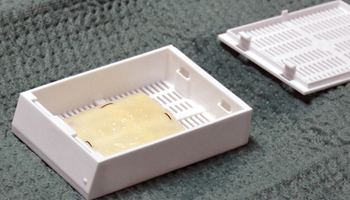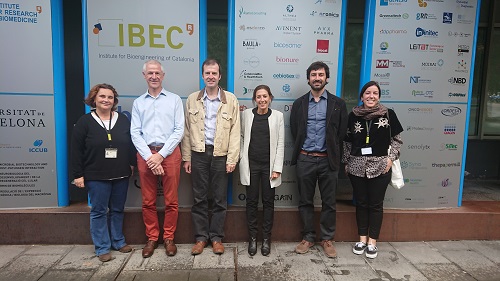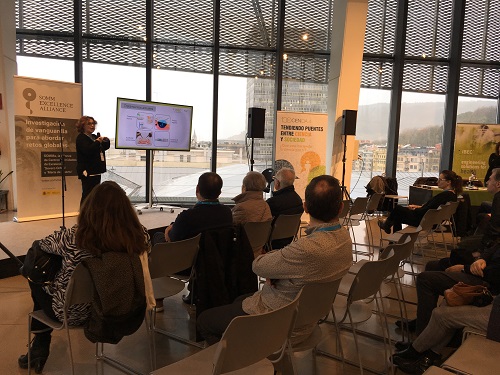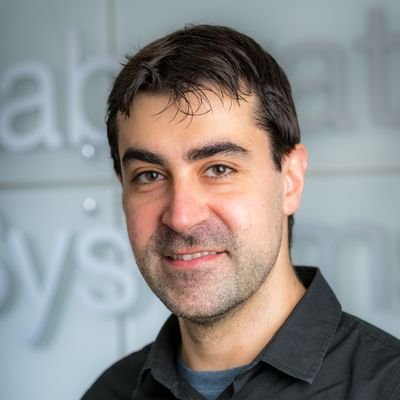 Àngels López
Àngels López
IBEC coordina un proyecto para promover la regeneración de la piel usando nanopartículas e impresión 3D
 Elisabeth Engel, investigadora principal del grupo «Biomateriales para terapias regenerativas» en el IBEC coordinará un proyecto de tres años con el objetivo de impulsar la autorregeneración de la piel. Un total de cinco socios forman este consorcio transnacional a nivel europeo que desarrollaran el proyecto durante los próximos 3 años, entre ellos; Dimitrios Zeugolis (Universidad de Ioannina, Grecia), Joan Pere Barret (Hospital Universitari Vall d’Hebron, España), Olivier Stephan (Université Grenoble-Alpes, Francia) y Denis Barbier (MicroLight 3D, Francia).
Elisabeth Engel, investigadora principal del grupo «Biomateriales para terapias regenerativas» en el IBEC coordinará un proyecto de tres años con el objetivo de impulsar la autorregeneración de la piel. Un total de cinco socios forman este consorcio transnacional a nivel europeo que desarrollaran el proyecto durante los próximos 3 años, entre ellos; Dimitrios Zeugolis (Universidad de Ioannina, Grecia), Joan Pere Barret (Hospital Universitari Vall d’Hebron, España), Olivier Stephan (Université Grenoble-Alpes, Francia) y Denis Barbier (MicroLight 3D, Francia).
El proyecto forma parte del programa EuroNanoMed3, y el consorcio recibirá un total de 747.000 € a través de las agencias de financiación nacionales correspondientes de los países involucrados. En concreto, la «Agencia Estatal de Investigación» financiará la contribución del IBEC con 190.000 €.
Bioingenieros IBEC contribuyen a un implante para el corazón
Un grupo del Instituto de Bioingeniería de Cataluña (IBEC) liderado por Daniel Navajas contribuye a una operación diseñada para reparar el tejido cardíaco de un paciente de 70 años que había sufrido un infarto.
Esto ha sido posible mediante la creación de un bioimplante enriquecido con células madre. La operación es fruto del trabajo conjunto, durante más de diez años, de científicos, médicos e ingenieros.
Research Assistant at the Translational Fibroblast Mechanobiology Research Group
Application Deadline: 12/12/2019
Ref: RA-JA
The Translational Pulmonary Fibroblast Mechanobiology Group of Dr Jordi Alcaraz is looking for a Research Assistant to study the aberrant fibroblast phenotypes of lung cancer patients, with the ultimate goal to identify new therapeutic targets, resistance mechanisms to current therapies and/or biomarkers.
Junior Communication Officer
 Application Deadline: 20/12/2019
Application Deadline: 20/12/2019
Ref: JCOT_GO
The Communications Unit is looking for a Junior Communication Officer to reinforce the international reputation of IBEC and provide support to European Projects coordinated by the Institute.
This position will be funded by H2020 European Union programme.
Postdoctoral researcher at Integrative Cell and tissue dynamics group

Application Deadline: 12/12/2019
Ref: PD-XT
The Integrative cell and tissue dyamics group at the Institute for Bioengineering of Catalonia (IBEC) is looking for Postdoctoral Researcher to work on the Mechanics of Intestinal Organoids. The contract will be within the framework of Mechanobiology, whose objective is to unveil the interplay between mechanics of biological function.
Predoctoral Positions at IBEC within “la Caixa” Doctoral Fellowships INPhINIT
IBEC aims to train the next generation of researchers in bioengineering for future medicine, active ageing, and regenerative therapies. Thanks to IBEC’s interdisciplinarity, the most recent technical and technological approaches … Read more
Senior Technician at the Integrative Cell and Tissue Dynamics Research Group
 Application Deadline: 12/12/2019
Application Deadline: 12/12/2019
Ref: LA-XT
The Integrative cell and tissue dyamics group at the Institute for Bioengineering of Catalonia (IBEC) is looking for Laboratory Senior Technician to participate on the project Mechanobiology of collective cell migration during haptotaxis and durataxis: application to intestinal organoids. (mGRADIENT ).
Elisabeth Engel en radio Euskadi
 En motivo del encuentro de los centros de excelencia Severo Ochoa y Maria de Maeztu (SOMMa) en el evento 100xCiencia, celebrado en San Sebastián los días 22 y 23 de noviembre, Elisabeth Engel habla en radio Euskadi sobre los ápositos inteligentes que están desarrolando en su laboratorio. Estos apósitos liberan nanopartículas que contienen calcio para curar lesiones crónicas como por ejemplo las úlceras.
En motivo del encuentro de los centros de excelencia Severo Ochoa y Maria de Maeztu (SOMMa) en el evento 100xCiencia, celebrado en San Sebastián los días 22 y 23 de noviembre, Elisabeth Engel habla en radio Euskadi sobre los ápositos inteligentes que están desarrolando en su laboratorio. Estos apósitos liberan nanopartículas que contienen calcio para curar lesiones crónicas como por ejemplo las úlceras.
Joan Montero and colleagues in Boston suggest a new strategy for melanoma patients
IBEC researcher Joan Montero authors a paper in Nature Communications which uncovers a key adaptation that melanoma cancer cells use to evade current therapies. This finding might allow physicians to use better drug combinations to improve patient outcomes in the future.
Despite significant advances in cancer diagnosis and treatment, most targeted cancer therapies fail to achieve complete tumor regressions or durable remission. Understanding why these treatments are not always efficient has remained a main challenge for researchers and physicians. Now, Joan Montero from the IBEC and colleagues at Dana-Farber Cancer Institute/Harvard Medical School in USA report in Nature Communications a mechanism that uncovers why some therapies fail to treat melanoma.


 Elisabeth Engel, investigadora principal del grupo «Biomateriales para terapias regenerativas» en el IBEC coordinará un proyecto de tres años con el objetivo de impulsar la autorregeneración de la piel. Un total de cinco socios forman este consorcio transnacional a nivel europeo que desarrollaran el proyecto durante los próximos 3 años, entre ellos; Dimitrios Zeugolis (Universidad de Ioannina, Grecia), Joan Pere Barret (Hospital Universitari Vall d’Hebron, España), Olivier Stephan (Université Grenoble-Alpes, Francia) y Denis Barbier (MicroLight 3D, Francia).
Elisabeth Engel, investigadora principal del grupo «Biomateriales para terapias regenerativas» en el IBEC coordinará un proyecto de tres años con el objetivo de impulsar la autorregeneración de la piel. Un total de cinco socios forman este consorcio transnacional a nivel europeo que desarrollaran el proyecto durante los próximos 3 años, entre ellos; Dimitrios Zeugolis (Universidad de Ioannina, Grecia), Joan Pere Barret (Hospital Universitari Vall d’Hebron, España), Olivier Stephan (Université Grenoble-Alpes, Francia) y Denis Barbier (MicroLight 3D, Francia). 




 En motivo del encuentro de los centros de excelencia Severo Ochoa y Maria de Maeztu (SOMMa) en el evento 100xCiencia, celebrado en San Sebastián los días 22 y 23 de noviembre, Elisabeth Engel habla en radio Euskadi sobre los ápositos inteligentes que están desarrolando en su laboratorio. Estos apósitos liberan nanopartículas que contienen calcio para curar lesiones crónicas como por ejemplo las úlceras.
En motivo del encuentro de los centros de excelencia Severo Ochoa y Maria de Maeztu (SOMMa) en el evento 100xCiencia, celebrado en San Sebastián los días 22 y 23 de noviembre, Elisabeth Engel habla en radio Euskadi sobre los ápositos inteligentes que están desarrolando en su laboratorio. Estos apósitos liberan nanopartículas que contienen calcio para curar lesiones crónicas como por ejemplo las úlceras. 